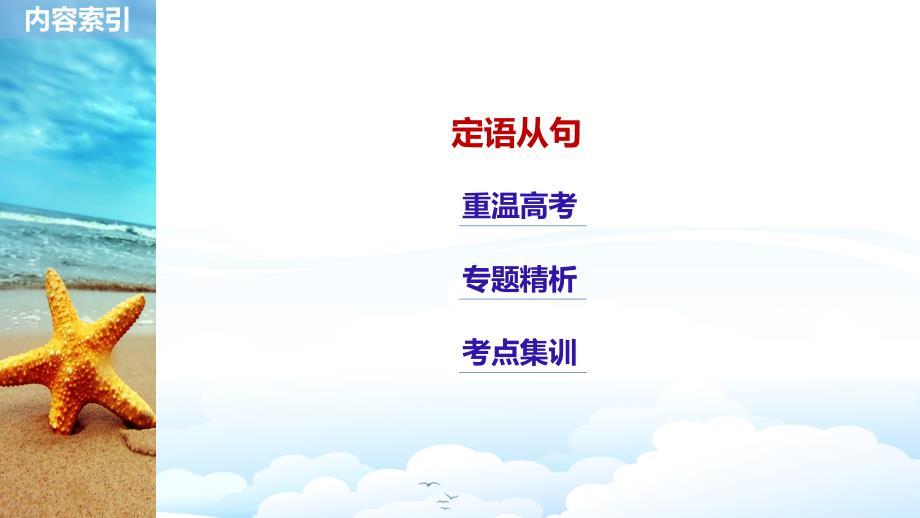《高三英語(yǔ)一輪復(fù)習(xí)語(yǔ)法專題:(浙江)定語(yǔ)從句課件》由會(huì)員分享�����,可在線閱讀���,更多相關(guān)《高三英語(yǔ)一輪復(fù)習(xí)語(yǔ)法專題:(浙江)定語(yǔ)從句課件(36頁(yè)珍藏版)》請(qǐng)?jiān)谘b配圖網(wǎng)上搜索����。
1��、重溫高考,內(nèi)容索引,專題精析,考點(diǎn)集訓(xùn),定語(yǔ)從句,重溫高考內(nèi)容索引專題精析考點(diǎn)集訓(xùn)定語(yǔ)從句,重溫高考,重溫高考,2,單句語(yǔ)法填空,I,d skipped nearby Guilin,�����,,a dream place for tourists seeking the,limestone mountain tops and dark waters of the Li,River,_,are pictured by artists in so many Chinese paintings.(2015,全國(guó),),解析,先行詞為指物的,mountain tops and dark waters,���,關(guān)系詞在
2���、定語(yǔ)從句中作主語(yǔ)�,因此答案為,that/which,�。,考向,1,關(guān)系代詞引導(dǎo)的限制性定語(yǔ)從句,答案,解析,that/which,單句語(yǔ)法填空考向1關(guān)系代詞引導(dǎo)的限制性定語(yǔ)從句答案解析th,考向,2,“,介詞,whom/which,”,或關(guān)系副詞引導(dǎo)的限制性定語(yǔ)從句,1,2,單句語(yǔ)法填空,1.When harvest came around,����,,he was already selling herbs,,,vegetables and cotton in the market,people from the towns met regularly.(2015,廣東,),解析,根據(jù)句子結(jié)構(gòu)可以判
3����、斷,在這里應(yīng)填關(guān)系詞來(lái)引導(dǎo)一個(gè)定語(yǔ)從句��,修飾表地點(diǎn)的先行詞,the market,���,且關(guān)系詞在定語(yǔ)從句中作狀語(yǔ)�,故填關(guān)系副詞,where,�����。,答案,解析,where,考向2“介詞whom/which”或關(guān)系副詞引導(dǎo)的限制性,2.Behind him were other people to,he was trying to talk,�����,,but after some minutes they walked away and sat near me,,,looking annoyed.(2011,廣東,),解析,此處是一個(gè)定語(yǔ)從句����,缺少關(guān)系代詞,因?yàn)橄刃性~為,other people,�����,指的是人
4�����、�����,而且與介詞,to,連用���,所以填,whom,���。,答案,解析,whom,1,2,2.Behind him were other people,考向,3,關(guān)系代詞或關(guān)系副詞引導(dǎo)的非限制性定語(yǔ)從句,單句語(yǔ)法填空,1.Like anything,,,it is possible to have too much of both,,,is not good for the health.(2017,全國(guó),),解析,分析句子結(jié)構(gòu)可知����,空格處所填詞引導(dǎo)非限制性定語(yǔ)從句并在從句中作主語(yǔ),且指代整個(gè)主句的內(nèi)容����,故填關(guān)系代詞,which,。,答案,解析,which,1,2,3,4,5,6,考向3關(guān)系代詞或關(guān)系副詞
5���、引導(dǎo)的非限制性定語(yǔ)從句單句語(yǔ)法填空,2.But Sarah,���,,has taken part in shows along with top models,����,,wants to prove that she has brains as well as beauty.(2017,全國(guó),),解析,引導(dǎo)詞代替先行詞在從句中作主語(yǔ),且指人�����,故用,who,�����。,答案,解析,who,1,2,3,4,5,6,2.But Sarah,has taken,3.Pahlsson and her husband now think the ring probably got swept into a pile of
6��、kitchen rubbish and was spread over the garden,���,,it remained until the carrot,s leafy top accidentally sprouted(,生長(zhǎng),)through it.(2017,浙江,),解析,考查定語(yǔ)從句的引導(dǎo)詞��。分析句子結(jié)構(gòu)可知��,空格處所在的句子是非限制性定語(yǔ)從句����,修飾前面的先行詞,the garden,����,且從句中缺少地點(diǎn)狀語(yǔ),故用,where,引導(dǎo)該定語(yǔ)從句�����。,答案,解析,where,1,2,3,4,5,6,3.Pahlsson and her husband now,4.But my connec
7�����、tion with pandas goes back to my days on a TV show in the mid-1980s,����,,I was the first Western TV reporter permitted,to film a special unit caring for pandas rescued from starvation in the wild.,(2016,全國(guó),),解析,先行詞是表示時(shí)間的,the mid-1980s,��,且從句中缺少狀語(yǔ)��,故填關(guān)系副詞,when,��。,答案,解析,when,1,2,3,4,5,6,4.But my connection w
8��、ith panda,5.Some people think that the great Chinese scholar Confucius,����,,lived from roughly 551 to 479 B.C.,����,,influenced the development of chopsticks.,(2016,全國(guó),),解析,所填詞引導(dǎo)非限制性定語(yǔ)從句�����,先行詞指人�����,且在從句中作主語(yǔ)��,故填,who,。,答案,解析,who,1,2,3,4,5,6,5.Some people think that the g,6.Of course whenever they turned to look at
9�����、 him,�����,,they had to look at Mary,����,,made her feel like a star.(2012,廣東,),解析,由逗號(hào)可知此處是一個(gè)非限制性定語(yǔ)從句,修飾前面整個(gè)句子所表述的內(nèi)容�,故用,which,引導(dǎo)。,答案,解析,which,1,2,3,4,5,6,6.Of course whenever they turn,專題精析,專題精析,定語(yǔ)從句的句法功能及相關(guān)定義,1.,功能:相當(dāng)于形容詞�,修飾名詞或代詞,在句中作定語(yǔ)��。,2.,位置:定語(yǔ)從句常置于被修飾詞之后�����;,as,引導(dǎo)的非限制性定語(yǔ)從句可置于主句前�、句中,也可置于主句之后��。,Those who are f
10、or the plan raise your hands,�,,please.,As is known to us all,,,the earth is spinning around the sun.,定語(yǔ)從句的句法功能及相關(guān)定義,3.,先行詞:被定語(yǔ)從句修飾的詞稱為先行詞���。,先行詞一般是名詞和不定代詞�����,如:,some-,����,,any-,��,,every-,�����,,no-,與,-body,���,,-thing,的合成詞或,all,,,none,�����,,any,,,some,��,,that,�����,,those,等代詞���。數(shù)詞和人稱代詞也同樣可作先行詞���。,4.,關(guān)系詞:連接先行詞與從句的詞叫關(guān)系詞。,關(guān)系代詞:,who,
11����、,,whom,����,,which,,,that,�,,whose,,,as,等�����。,關(guān)系副詞:,when,,,where,��,,why,等�。,3.先行詞:被定語(yǔ)從句修飾的詞稱為先行詞。,定語(yǔ)從句的核心考點(diǎn),1.,確定關(guān)系詞的步驟:,(1),先找先行詞��,看先行詞指的是什么���。,(2),看關(guān)系詞在從句中所充當(dāng)?shù)某煞帧?注意:,先行詞與關(guān)系詞是等量關(guān)系�����。,(1),先行詞在從句中作主語(yǔ)時(shí)�,從句謂語(yǔ)動(dòng)詞的數(shù)由先行詞而定��。,This is the place which is worth visiting.,(2),關(guān)系詞在從句中充當(dāng)了成分�,其意思就是先行詞的意義,所以在從句中不能重復(fù)其意�。,There are ma
12、ny places we can visit in China.(visit,后面不能再加,many places/them),定語(yǔ)從句的核心考點(diǎn),2.,在定語(yǔ)從句中��,當(dāng)先行詞指物時(shí)����,下列情況的關(guān)系詞用,that,而不用,which,:,(1),當(dāng)先行詞是序數(shù)詞或形容詞最高級(jí)或被序數(shù)詞、形容詞最高級(jí)修飾時(shí)����。,(2),先行詞被,all,,,every,����,,no,,,some,����,,any,,,little,����,,much,,,the only,���,,the very,���,,few,等修飾時(shí)。,(3),先行詞為,all,��,,much,�����,,little,,,none,�,,few,,,something,�����,,
13��、anything,等不定代詞時(shí)����。,2.在定語(yǔ)從句中,當(dāng)先行詞指物時(shí)��,下列情況的關(guān)系詞用that,(4),先行詞中既有人又有物時(shí)����。,He was looking pleasantly at the children and parcels that filled his bus.,(5),先行詞在主句中作表語(yǔ)時(shí)。,The village is no longer the one that was 5 years ago.,(6),當(dāng)主句是以,which,開頭的特殊疑問(wèn)句時(shí)����。,Which are the books that you bought for me?,(4)先行詞中既有人又有物時(shí)。,3
14、.,用,which,而不用,that,的情況:,(1),在非限制性定語(yǔ)從句中��。,(2),當(dāng)關(guān)系詞前有介詞時(shí)�。,(3),當(dāng)先行詞本身是,that,時(shí)����。,(4),關(guān)系詞后有插入語(yǔ)時(shí)。,3.用which而不用that的情況:,4.,關(guān)系詞,who,與,that,指人時(shí)�,根據(jù)不同情況分別用不同的關(guān)系詞。,(1),當(dāng)主句是,there be,句型時(shí)���,關(guān)系詞用,who,��。,(2),先行詞是,anyone,��,,those,�����,,someone,��,,everyone,��,,one,等詞時(shí)���,關(guān)系詞用,who,���。,(3),當(dāng)主句是,who,作疑問(wèn)詞時(shí),關(guān)系詞用,that,��。,Who is that girl that
15����、 is standing by the window?,(4)whom,在從句中只作賓語(yǔ),可被,who,取代��。,5.whose,作關(guān)系詞既指人又指物����,在從句中作定語(yǔ)。,Do you know Mr Smith whose story is very moving?,There is a room,����,,whose window faces the river.,4.關(guān)系詞who與that指人時(shí),根據(jù)不同情況分別用不同的關(guān),6.,關(guān)系代詞,as,在從句中作主語(yǔ)�����、賓語(yǔ)或表語(yǔ)�����。,(1),先行詞被,such,和,the same,修飾,或句型,as many(much),中���,從句都用,as,引導(dǎo)���。,Su
16��、ch books as you bought are useful.,注意:,such.that.,引導(dǎo)結(jié)果狀語(yǔ)從句��。如:,They are such lovely children that we love them much.,the same.as.,和,the same.that.,都可引導(dǎo)定語(yǔ)從句���,前者表示,“,與,同樣的,(,但不是同一個(gè),),”,��;后者表示,“,同一個(gè)����,就是那個(gè),”,如:,This is the same pen as I lost last week.,這同我上周丟失的那支鋼筆一樣�����。,(,但不是同一支,),This is the same pen that I lost last week.,這就是我上周丟的那支鋼筆���。,6.關(guān)系代詞as在從句中作主語(yǔ)����、賓語(yǔ)或表語(yǔ)。,(2),先行詞為句子�����,定語(yǔ)從句用,as,或,which,引導(dǎo)���。,區(qū)別:,意義上:,as,含有,“,這點(diǎn)正如,一樣,”,�。,位置上:,as,從句可置于句首�����,也可在句中或句尾���;,which,引導(dǎo)的非限制定語(yǔ)從句只能放在主句之后�。,He didn,t pass the exam,���,,as we ha
 高三英語(yǔ)一輪復(fù)習(xí)語(yǔ)法專題:(浙江)定語(yǔ)從句課件
高三英語(yǔ)一輪復(fù)習(xí)語(yǔ)法專題:(浙江)定語(yǔ)從句課件

